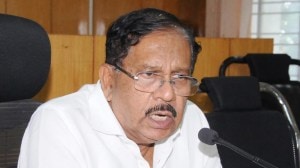Swapping 3 Indian engineers with 11 Taliban terrorists — the Afghan deal, explained
In May 2018, seven Indians engineers working with Indian power company KEC International were abducted by the Taliban in the Baghlan province in northern Afghanistan. In March this year, one of the kidnapped engineers returned safely to India.
 Mullah Abdul Ghani Baradar, the Taliban group’s top political leader, left, and Sher Mohammad Abbas Stanikzai, the Taliban’s chief negotiator, talk to each other during a meeting in Moscow, Russia. (AP File Photo: Alexander Zemlianichenko)
Mullah Abdul Ghani Baradar, the Taliban group’s top political leader, left, and Sher Mohammad Abbas Stanikzai, the Taliban’s chief negotiator, talk to each other during a meeting in Moscow, Russia. (AP File Photo: Alexander Zemlianichenko)
The Afghan Taliban on Sunday freed three Indian engineers that they had taken hostage last year, in exchange for the release of 11 of the terrorist group’s members who had been imprisoned in Afghanistan.
In May 2018, seven Indians engineers working with Indian power company KEC International were abducted by the Taliban in the Baghlan province in northern Afghanistan. In March this year, one of the kidnapped engineers returned safely to India.
The prisoner-swap deal follows meetings between US Special Representative for Afghanistan Reconciliation Zalmay Khalilzad and Taliban representatives led by Mullah Abdul Ghani Baradar in Islamabad over the weekend.
The kidnapping of May 2018
The engineers from India were working for KEC, a global infrastructure engineering, procurement and construction major, and one of the largest Indian companies in Afghanistan responsible for electricity supply in the country.
In May 2018, while they were working at a power station in Baghlan province, the Indian engineers were kidnapped from their vehicle along with their Afghan driver. According to local reports, the KEC employees were taken away by armed men in Bagh-e-Shamal village of the provincial capital Pul-e-Khomri, while they were travelling to the area where KEC has a contract to operate an electricity sub-station.
The Afghan news organisation TOLOnews had then reported that the Taliban group had moved the KEC employees to Dand-e-Shahabuddin area of Pul-e-Khomri city.
Earlier abductions of Indians
This wasn’t the first time that Indians working in Afghanistan were kidnapped.
In July 2016, Indian aid worker Judith D’Souza was rescued more than a month after she was kidnapped in Kabul.
In June 2014, Father Alexis Prem Kumar, a Roman Catholic priest from India, was abducted by unidentified gunmen in the Afghan city of Herat. He was released in February 2015.
Between 2003 and 2008, three Indians were kidnapped and released. However, two Indians were killed after they were abducted.
 Mullah Abdul Ghani Baradar (3rd L), who is leading Taliban Political Commission (TPC) delegation, attends a meeting at the Ministry of Foreign Affairs in Islamabad, Pakistan October 3, 2019. Ministry of Foreign Affairs (Photo via Reuters)
Mullah Abdul Ghani Baradar (3rd L), who is leading Taliban Political Commission (TPC) delegation, attends a meeting at the Ministry of Foreign Affairs in Islamabad, Pakistan October 3, 2019. Ministry of Foreign Affairs (Photo via Reuters)
The released Taliban members
The BBC reported that among the 11 militants freed were three key Taliban figures, including a member of the Haqqani Network.
According to The New York Times, one of them is Abdul Rashid Baluch, who was previously listed as a Specially Designated Global Terrorist by the US Treasury Department. Baluch has been accused of deploying suicide bombers and helping finance the Taliban through the drugs trade in Afghanistan.
Another member, the BBC said, was a “shadow” governor for Kunar province, and a member of the powerful Haqqani Network.
The terrorist network, an offshoot of the Taliban which was founded by the radical cleric and veteran Afghan mujahideen commander Jalaluddin Haqqani, takes its name from the Darul Uloom Haqqania madrasa in Pakistan and is headquartered in Miramshah in Pakistan’s North Waziristan. The Haqqani Network is accused of plotting co-ordinated attacks on both Afghan and NATO forces in Afghanistan.
The Taliban members have been released from the high-security Bagram prison.
Don’t miss from Explained: Ahead of proposed Modi-Xi meeting, understanding ‘Informal Summits’
- 01
- 02
- 03
- 04
- 05






































